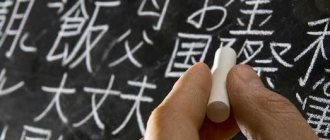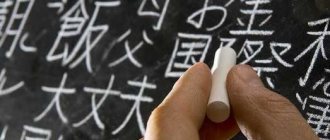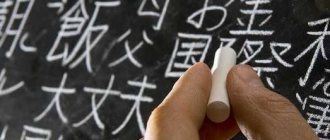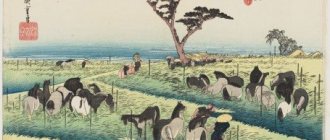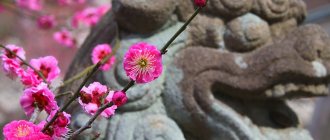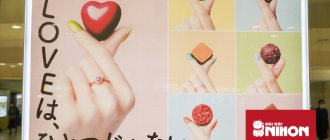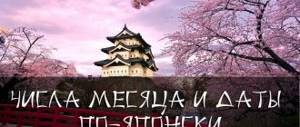Japanese female names, unlike male ones, in most cases have a simple reading and a clear, understandable meaning.
Most female names are composed according to the “main component + exponent” scheme, but there are names without an indicative component. Sometimes female Japanese names may be written entirely in hiragana or katakana. Also, sometimes there are names with an on reading, and also only in female names there are new non-Chinese borrowings (gairaigo). In Japanese female names consisting of two or more hieroglyphs, there is usually a component at the end of the name that indicates that this name is a female one. Just as in male names, the component often determines how the entire name is read - by ono or by kun.
List of Japanese girl names in translation
Azumi - safe place of residence Azemi - thistle flower Ai - love Ayano - the colors of silk Akemi - bright beauty Aki - autumn, bright Akiko - autumn child or smart child Akira - bright, clear, dawn Akane - old Japanese girl's name - shiny, red Amaterezu - bright across the skies Ameya - evening rain Aoi - blue Arizu - noble appearance Asuka - aroma Asemi - feminine morning beauty Atsuko - hardworking, warm child Aya - colorful or woven silk Ayaka - colorful flower, fragrant summer Ayako - academic child Ayam - rainbow shell Banko - literary child Janko - pure child Jun - obedient Zhina - silvery Izumi - fountain Izenemi - woman who invites Yoko - ocean child, confident child Yoshi - fragrant branch, good bay Yoshiko - fragrant, good, noble child Yoshshi - good Kam – turtle (symbol of long life) Kayao – beautiful generation, generation of increase Keiko – happy, respectful child Kei – respectful girl Kyoko – pure child Kiku – chrysanthemum Kimi – short for names starting with “Kimi” Kimiko – beautiful child of history, dear child , ruling child Kin - golden woman Kyoko - child of the capital Kotoun - sound of the harp Koheku - amber Kumiko - beautiful, long-lasting child Kaed - maple Kezu - branch, first blessed, harmonious Kazuko - harmonious child Kezumi - harmonious beauty Kemeio - turtle (symbol of long life ) Kemeko - turtle (symbol of long life) Keori - fragrance Keoru - fragrance Katsumi - victorious beauty Mari - beloved woman Megumi - blessed Miwa - beautiful harmony, three rings Midori - green Mizuki - beautiful moon Mizeki - flower of beauty Miyoko - beautiful child of the generation, third child of the generation Mika - beautiful aroma Miki - beautiful tree, three trees Miko - beautiful child of blessings Minori - beautiful harbor, village of beautiful areas Mineko - beautiful child Mitsuko - full child (of blessings), bright child Miho - beautiful bay Michi - Michiko - child on the right path, a thousand beauties of a child Miyuki - beautiful happiness Miyako - beautiful child in March Mommo - peach Momo - a hundred blessings, a hundred rivers Momoko - peach child Moriko - forest child Madoka - calm maiden Mezumi - enhanced beauty, true purity Mazeko - rule child Mazamy – true, graceful beauty Mei – dance Meiko – dance of a child Meyumi – true bow, true engrossed beauty Meki – true record, Mana – true Menami – beauty of love Mariko – true reason child Maesa – abbreviation for names starting with “Masa” ” Nana - the seventh Naoki - the honest tree Naomi - beauty above all Nobuko - the devoted child Nori - short for names starting with “Nori” Noriko - the child of principles Neo - the honest Neoko - the honest child Natsuko - the summer child Natsumi - the summer beauty Ran - water lily Reiko - a beautiful, courteous child Rei - a polite woman Ren - water lily Rika - appreciated aroma Riko - jasmine child Ryoko - good child Sake - Cape Setsuko - moderate child Sora - sky Suzu - bell Suzumu - progressing Suzyum - sparrow Sumiko - clear, thinking child , pure child Seyeri - small lily Sekera - cherry blossom Sekiko - blooming child, earlier child Sengo - coral Sechiko - happy child Teruko - bright child Tomiko - beauty-preserving child Tomoko - friendly, wise child Toshi - emergency Toshiko - child of many years, priceless child Tsukiko - lunar child Tekeko - tall, noble child Tekera - treasure Tamiko - child of abundance Uzeji - rabbit Umeko - child of the plum blossom Ume-elv - plum blossom Fuji - wisteria Fumiko - child who preserved beauty Hideko - luxurious child Hizeko - long-lasting child Hikeri - light or shining Hikeru - light or bright Hiro - widespread Hiroko - generous child Hiromi - widespread beauty Hitomi - the name is usually given to girls with especially beautiful eyes Hoteru - firefly, lightning bug Hoshi - star Hena - favorite or flower Heneko - loafer Heruka - far Heruki - tree of springtime Heruko - child of springtime Herumi - beauty of springtime Chi - wisdom, a thousand blessings Chiyo - a thousand generations Chiyoko - child of a thousand generations Chika - wisdom Chiko - wise child, a thousand blessings of a child Chikeko - child of wisdom Chinatsu - a thousand years Chiheru - one thousand springs Chiesa - a morning repeated a thousand times Cho - a butterfly Shayori - a bookmark, a guide Shig - an abbreviation for names starting with “Shij” Shijeko - an exuberant child Shizuka - a quiet girl Shizuko - calm a child Shika - a gentle deer Shinju – pearl Eiko – long-lasting child, luxurious child Eika – song of love Eiko – beloved child, child of love Eimi – beauty of love Eyumi – walk Emi – smile Emiko – smiling child Eri – happy prize Etsuko – joyful child Yuka – fragrant, friendly blossoming Yuki – happiness, snow Yukiko - child of snow or happy child Yuko - useful, superior child Yumi - bow, useful beauty Yumiko - beautiful, useful child Yuri - lily Yuriko - child of the lily, dear child Yayoi - spring Yasu - calm girl Yasuko - honest child, peaceful child
LiveInternetLiveInternet
Quote from Akemi_Kayuki's message
Read in full In your quotation book or community!
Japanese names and their translations.
=^__^= Found it on the Internet. =^__^=
NAMES IN JAPANESE Yuki - snow Hotaru - firefly Yukino (more like a surname) - snow field Hotarubi - beautiful firefly Shiro - “innocence” or “white” Awasaku-mi-tama - Sacred spirit of the forming foam Amehototsune - Heavenly lonely root Wakasaname- but Kami - Goddess of young rice plantings Iwatsutsu-no-o-no Kami - Husband of the Stone Heavenly Ax Arumi - aluminum Kamui - Participating in the festivities Tetsuko - Wise Aiko - love Muraki - “inconstancy”, “whims” Tomoe - Acquired friend Migumi - “ Mi" - beautiful, "gumi" - the name of the fish cucumaria bristly, it turns out "Beautiful gumi" Shi no hoshi - Lilac star Umi no nami - sea wave Meko - Sincere, truthful Asuka - love, love Shinji - considered an unfortunate name in Japan , because shin is translated as “death” Ayanami - strip of fabric, wave pattern Rei - zero, example, soul Suzu - bell Hara - Misato plain - beautiful city Katsuragi - fortress with walls entwined with grass Aida - Gendo's favorite rice field - dark , the secret path of Rokobungi - cultist Kaji - helmsman Mitsuki - "mitsu" - honey, "ko" - diminutive ending used in female names Yoru-o miru - Looking into the night Hikari-o keikosuru - Bringer of light Minako - Young and beautiful, or Beautiful as a child Shaki, aka Shaki - sacred hope Hikaru Sen - Shining future Sobio - Majestic beauty Akira - Bright Heishiro - Noble warrior (soldier) Renji - wooden partition " - a purely Japanese term Sutoku - Doing good Hige - Humble Kemuri - Smoke Youko - Ray of light Haruka Teno - Distant Heavenly Emperor Omoiyari-o keikosuru aku - evil that brings good Shaoran - Little wolf Ike - lake Nanako - summer, or love, beloved, strong feelings Kayuki - snow flower or Flower in the snow Ritsuka or Ritsuka - Jasmine under the moon, where "ri" is jasmine, and "tsuki" is the moon Tsukihikari-o Doshi - like moonlight or descended with moonlight Sasuke - help, save Nori - immortality Aneko - follow a cat or inherit a cat Kuroi Taiyo - Dark sun Nezumi-iro no hikari - Ash light Guntai no kokoro - Heart of the army or army heart Kuroi himitsu - Dark secret Eien no hi - Eternal flame Setsuna - minute, period of time Hayate - fast wind Kyou - big, huge Sasame - thin snow Rin - Hayashi Park - Bright and Early Fujimiya - Selfless Service to a Shinto Shrine Aya - Asian Flower Hidaka Ken - High Heavenly Sun Kudo - Eternal Land Yoji - Look Within Omi - Beautiful Heart Naoe - Reflecting Power Asahi-no Hikari - Light of the Sun Honda - Wavy Field Shinta - Great Expectations Orihime - Swinging Maiden Nagira - deep calm Shunji - insight, sanity Doujima Yurika - aroma of the Earth Karasuma - raven Miho - floating in the ocean Zaizen - well-being Takuma - perfection of skill Amon - Asian style Sena - sandy shore Hibiki - elegant (-ness) Shin - heart Fukae - Deep Harbor Rave, Hokage - Fiery shadow Yumi - Fragrant beauty Mayumi - Graceful beauty Shuichi - Source of life Shindo - New time Eiri - Displaying the truth Eji - My land Kudo - Long times Mamoru - protect (- ik) Takatori - High flying bird Omichi - Long journey Tsukieno - Moon lotus Sobi - Incomparable Midorikawa - Green river Midori - color of foliage, tree leaves Hikaru - Glowing Saito Kaoin - Help of hope Tinkin no - Golden Enkagin no - Silver Hi-no (not to be confused with fire, it also sounds like “hi” - but is spelled differently) - Sunny Tsuki no Hikari - Moonlight or lunar light Mirai - future Hajime - chief Jibo - earth Hikari - light Atarashiki - transformation Namida - tears Sora - sky Ginga - universe Eva - living Izya - doctor Usagi - hare Tsukino - Lunar Rei - soul Hino - fire Ame - rain Mitsuno - water Kori - ice, icy Makoto - truth Kino - airy, forest Minako - Venus Aino - loving Setsuna – guard Meio – castle, palace Haruka – 1) distance, 2) heavenly Teno – heavenly Michiru – way Kayo – sea Hotaru – light Tomo – friend Hakufu – Noble sign Yusuke – free, free Naruto – Lucky man Akatsuki – sunrise Ai no uta - Love song Ayu - Trout in clear water Kinkan - golden ring Miho - sparkling star Natsuki - Summer tree, also an evergreen tree Rose - bara Shinjin - God-like Yasami Dako - Dripping early summer rain Sasuki - Sacred tree Hoko-noHi - Will-o'-the-wisp Junko - reliable Akemi - Beautiful oriental flower Ginko - Singing child Hirohisa - Extraordinary mind Akane - madder color Naoru - cured Yura - Two options: Bound by love and Snow flower, snowflake Mesiko - Call of antiquity (ancestors) Mitsume - eyes the color of water Seiten - blue skies Shin - heart Hitomi Hoshi - very bright\doubly beautiful star Atsuya Hi - Hot sun Sanran - Radiant Kaimei no Enko - Flame in the darkness Kin no Amanohagoromo - Golden angel Gaisengun - All-conquering Kyo - Huge, Exist, Morning Sun, Leaving Natsume - summer-colored eyes Ishi - Takayanagi Stone - Tall Willow Hasegawa - Beginning of the Yamashita River - Eighth Son Gin - Deceptive Sign Mamimi - Flax Stems Ayumi - Truth, Truth Shun - Excellence Tachikawa Chiaki - River of Light Manzo Mano - Immeasurable Space Heihachi Higuchi - Fire Hole Setsuko Hirata - Kind and Honest Nobuto - Huge Space Saku - Sharp Edge, Sakuya's Edge - Chemical Explosion or Spicy Night Shingo - New Language or Traffic Light Goei - Noble Akito - Man Born in Autumn Kuramori Reika - Treasure Protector or Cold Summer Kenshin - Test powers Rurouni - Wandering Wanderer Himura - Burning Village Shishio Makoto - True Hero Takani Megumi - Sublime Love Shinomori Aoshi - Green Bamboo Forest Makimachi Misao - Rule the City Saito Hajime - The Beginning of Human Life Hiko Seijuro - Justice Prevailed Seta Sojiro - Comprehensive Forgiveness Aya - The Art of Kensuke - Heavenly Meditation Miya - Shinto Shrine Misuki - Beautiful Love Sasuki - Helper Ken Hidaka - Sun High in the Sky Ran Fujimiya - Shinto Shrine Clerk Tsukasa - Summer Flower Petal Shiro/Shirou - white, pure Reiko - Praying Child Akiko - Autumn Girl Oniko - Little Ghost Kira - Beautiful Silk O-Ken - Heaven Yoki - Desired Gift Kei - Excellence Kei Hayashi - High Forest Daichi Kaoru - Fragrant Earth Yoji Kudou - Distant Echo Omichi Tsukiyono - Path of Moonlight in the Night Guei - Polyphonic Song Karyo - Lucky Geinin - Player Kokorozewashiya - Restless Shodoteki - Impulsive Yagiza - Squat Rock Sunano - Sandy Suna - Sand Shitsumon - Himitsu's Question - The Mystery of Enno - Alien Saigo - The Last Washi - Eagle Aneko - Ane - older sister and co - child Nakamura - naka - middle and Mura - Haruko village - spring child Hotaro - Protector Son Uchiha Sasuke - Consists of signs - Clover, Help, Selfish and Strike Keiko - little Shadow Yoshida - Excellent Rice Field Mitsukai no Aijou - Daughter of the Angel Madoshi - Mage Mushi - worm, insect O-seji - Flattery Kosen - Beam Kori - Ice Tano - another Yukiko - Snowflake Taki - Fubuki Falls - Igaina Blizzard - Unexpected Sawagi - Tensaiteki Noise - Omoide Genius - Inazuma Memory - Lightning Mijikai oto - Short Sound Hayaku kodo - Quick Action Asato - Sand City Akihito - Hopeful Man Mori - Forest Saori - Justice Rumi - Moonlight Sea Mika - Beautiful, skillful, beautiful Toru - Crossing Yumi - growing beauty Rina - Summer plum Miwa - Harmony of the sea Takumi - Proper beauty Taku - Aspiring to the heights Yuzuki - Crescent (arc-shaped moon) Kenjiro - Heavenly Son Choji - Carnation Chiyoko - Peaceful Wind - kaze Fire - hi Water - mizu Earth - chi Arima - Horse running by the pear tree Kippei - Peace Daiki - Great tree Sen - Spirit of the tree Oni - demon Kenshin - Sword Heart Ryuu - Dragon Hayate - swift wind Kiryu - Wood Dragon Kiken - Wooden Sword Kanoni - Sword Demon Un - Fate Unko - Child of Fate Unnamida - Tears of Fate Tsura - Kagero's colleague - Fleeting Moro - Misty Awaikage and Biko - Shadow Oni - Demon Zetsubo - Despair Takenaga - Long Bamboo Toshirou - Son of History Aizen - Love of Many Colors Shiba - Little Waves Yoshitzune - Ordinary Justice Zan - Reminder Akiyama - Autumn Mountain Kuzou - Citrus Takara - Silk Jewel Nomiya - Open Temple Asukai - Flying Bird Ten-no aya - Heavenly Pattern Sanzo - Three Foundations of the Buddhist Sutras Fuei - Shadow of the Wind Chiaka - does not have much meaning. "Ti" - small, "aka" - red Saito - "Thread of Help", "Genius", "brilliant harmony" Onimusha - demon warrior Meiun no Aruji - "lord of destruction" Masayoshi - Graceful Love Akio - skillful hero Azumi - love, feeling Hatsumi - Beautiful spring Asuka - Flying Bird Kurokarasu - black crow Takako - falcon Chitaka - 1000 falcons Suzume - sparrow Toki - Japanese ibis (by the way, I used this name for a girl in fanfic ^^) Kugenuma - a combination of hieroglyphs for “swan” and “swamp” Kugui - swan Kaden - Thunderbird Hakurenji - White dragon Akanesasusora - Sparkling skies Akaramu - sky at dawn Amagumo - cloudy sky Aodzora - blue sky Hekiku - clear sky Aoba - young foliage Kuroshin - black heart Hidomaru - Bright sun Tsume - in general, claws Kiba - Seasonal bird Shinichi - Four days Shinichiro - “Heart” and “First son in the family” Shin - heart Takeshi - Warrior Noda - a fairly common surname, consists of two hieroglyphs: “Field” and “Rice field” Uchiyama - Center Mountains Haruhiko - Spring Sun (female) Ryu - Dragon Odagiri - A small plot of land Hayato - a generous man Yabuki - flying arrow Tsuchiya - sign of the dragon Kosuke - great help Hyuga - meeting the sun Ryuichiro - the eldest of the dragons Kuroda - black field Tekanaki - Midsummer season Kodama - Shadow Ite and Chiyute - healing hand Tsume - Claw Hangyakuji - Rebellious Arai - Wild Gekko - Enraged Ayanokoji - Well-trodden little path Aki - Autumn Takeru - Strong, healthy Mika - jug, vase Midori - greenery, green color Tetsuro - Bright path Tomo - friend, companion Maiko - child of the dance Misato - purity, innocence, purification Masa - straight-grained wood (often used in the formation of names) Ogawa - stream, river, stream Gen - Beginning, Origin Bijitsuka - Artist Yoko - Light Sayuri - Cause of Happiness
Japanese female names
Japanese female names can be divided into several types, depending on the meaning of their main component.
Most female names fall into the group with an abstract meaning. Most often, such Japanese names use the components mi “beauty”, ai “love”, an “calmness”, ti “mind”, yu “tenderness”, ma “truth” and others. Usually, female names with such components are given as desiderata (wishes to possess these qualities in the future).
Another common type of Japanese girl names are names with animal or plant components. Names with the meaning of animals were given quite often in the past. For example, names associated with four-legged animals (such as “tiger” or “deer”) were considered to promote the health of the wearer. Nowadays, girls are practically not called such names; they are considered old-fashioned. The only exception so far is the “crane” component.
Names containing characters related to the plant world are still widespread in Japan. For example, the components hana “flower”, ine “rice”, kiku “chrysanthemum”, take “bamboo”, momo “peach”, yanagi “willow” and others are often found.
Modern Japanese names have many origins. One of them is partial borrowing from various languages.
How are names formed in Japan?
The art of naming, like origami or growing miniature bonsai trees, is passed down in families for generations. There is not a single Japanese who does not know the basic principles of naming, but, of course, not every resident of this country can come up with a truly beautiful and meaningful name for a newborn girl.
Each name is a compound word consisting of many others. The basic principles used when creating a naming are:
For example, a female name meaning “Death” can be supplemented with the epithets “instant” and “inevitable”. But they can also add explanations - “to preserve honor”, “to avoid a worse fate, shame.” Other additions to the core word are also possible, for example, words that add euphony and poetry.
For example, the name of the world famous Japanese cartoon creator Miyazaki has the following meaning:
Accordingly, the name of the cartoonist can be translated into Russian as “Palace with a temple on the cape.”
Japanese male names
Popular Japanese male names are presented here in Russian. These are modern beautiful Japanese boy names that are used by the Japanese population nowadays.
Male Japanese names are the most difficult part of Japanese writing to read; it is in male Japanese names that non-standard readings of nanori and rare readings, strange changes in some components are very common. Although there are also names that are easy to read.
For example, the names Kaoru, Shigekazu and Kungoro use the same character for "aroma", but it is read differently in each name. And the common component of names Yoshi can be written with 104 different characters and their combinations. Often, reading a Japanese male name is not at all connected with the written hieroglyphs of names, so it happens that only the bearer himself can read the name correctly.
How do they name children in Japan?
In Japan, as in Asia as a whole, children are named strictly in accordance with ancient traditions:
But not everyone has a family name, which is an analogue of a surname and performs the same function. Noble families do not use it. In Japan, members of the imperial family do not have it.
In the old days, large feudal lords who headed separate independent provinces did not have a family name. Accordingly, when the country was united under the rule of one clan, they lost their right to have no analogue of the surname. Many considered this fact a shame, a mortal insult. But very quickly the names of aristocratic clans replaced analogues of the surname, and representatives of the nobility calmed down.
What other names are directly associated with death?
Accordingly, if they are present in the name, it means that it is a male or female name with the meaning “Death”. However, the concept of “Shinigami” is much broader than the designation of the name of one deity. We can say that this is a whole subculture, very reminiscent of the gothic style familiar to Europeans.
The following names are directly related to death in their meaning:
Accordingly, each name, which contains part of these names, carries the meaning of death.
What name has the meaning "Death"?
Of course, there is also a female name that means “Death” in a literal rather than indirect sense. But even in this case there is a very significant caveat.
Women's names in Japan are the embodiment of poetry, harmony and abstraction. In other words, the very concept of death in Japanese female names is conveyed by image, description, as in poetry.
What name means "Death"? Miyuki - translated into Russian it is a whole poetic phrase - “the silence of deep snow.” Not the best meaning for a feminine name, is it? But not in Japan, because this name endows the girl with traits characteristic of the state of death, such as absolute peace, dispassion, serenity, and ignorance of vain worries.
Are there simple names in Japan?
Of course, not all modern Japanese families follow traditions. There are often cases when children are named after idols, popular literary characters or movie characters, politicians.
Modern Japanese youth often independently change the name given at birth to a European one or to the name worn by their favorite video game characters, musicians, or comic book characters.
However, this trend is not widespread. Most Japanese families honor traditions. In addition, those who decide to call themselves by a different name do not renounce their own, given by their parents, but simply take another one that they like.
How can you avoid this implication when choosing a Japanese name?
Before giving your daughter a beautiful-sounding exotic name, you need to not only know its translation, but also get an idea of the mentality, cultural characteristics, history, traditions and folklore of the country where it comes from.
This is especially important if a Japanese name is chosen. Knowledge of translation is not enough. Even knowing it, you can accidentally choose a female name for a newborn that means “Death.” For example, which European would be wary of the translation “chrysanthemum bush in bloom”? But chrysanthemum is one of the main symbols of death in Japan.
But in the modern world, the mutual penetration of cultures is so great, and superficial, that it is very difficult to avoid the temptation to name your daughter a beautiful exotic name.
What to do? Make up an adjective yourself, using as a basis a word that accurately conveys the desired meaning, but is not a specific concept. For example, you don’t need to use plant names, just the word “flower” is enough. It needs to be translated into Japanese using a dictionary, listen to the sound and add any additions. In this case, the negative, from a European point of view, meaning of the name can be avoided.
Source
